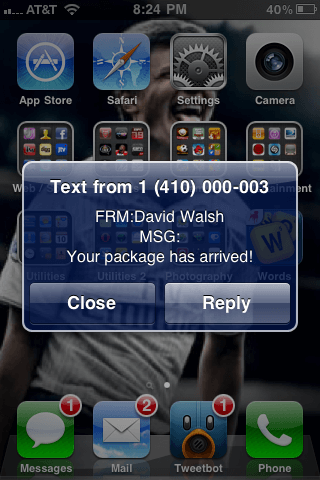Tech Recruiter Do’s and Don’ts
Tech recruiting is big business. Hire the right developers and you have the next big thing; hire the wrong developers and you have a team full of egos, problems, and headaches. I've gotten a fair share of recruiter emails over the past five years and, as someone trying to be recruited, I feel confident I can give decent insight into the do's and don'ts of tech recruiting. Want to recruit developers like me and other talented devs? Read this post.
Do: Extreme Personalization of Emails
Don't: Send "Stock" Emails
The most annoying recruiter email practice is that of the "one size fits all" recruiter; the recruiter that you know has one template where all they ever change is the recruitee's first name. Developers aren't all the same so your stock email will be "found out" in a glance. The best recruiter email I ever received had the subject line ARSENAL! ARSENAL! ARSENAL! This developer knew enough about me to chant the name of my favorite team; I read his email and listened to his pitch because he took the time to know my interests outside of web development. Extreme personalization from this recruiter worked.
Do: Tell Me the Business Name
Don't: Make Me Guess What's Behind Door Number Three
Throwing a teaser like "a top education company" at me instantly disqualifies your email; it tells me you don't trust me enough to give you the referral and that I would go around you to apply to the company directly. You're already insulting the person you're trying to make money off of. If you're presenting a great opportunity to a prospective hire, they'll be more than happy to name you as the referral and get you the credit you deserve. Playing the guessing game with someone you want to trust you is farcical and you're simply wasting your time.
Do: Follow Up at Reasonable Intervals
Don't: Track My Every Move
An email every 4 months is reasonable; an email each month isn't reasonable and will get you pushed straight to spam. The truth is that any sane developer decides to leave a job over a period of months; no stable developer leaves an employer due to one decision or on a whim. Checking in over reasonable intervals keeps you off of a developer's spam list and keeps them intrigued. Give a developer space and they will give you the time.
Do: Ask Dev Managers to Email Recruits
Don't: Ask HR to Email Recruits
Receiving an email from a perspective boss or tech-savvy person is five times more likely to be successful than an email from a HR person. Getting recruited by fellow developers allows us to ask questions and speak to professionals we trust, professionals that can provide real answers. Asking HR these questions results in two undesirable actions: a "I'll go ask {manager} about those" or "we can discuss that in future communications." Interfacing directly with a manager provides instant comradery and respect.
These four tips should be gold for any recruiter. There are more tips I could give but none of them are nearly as important as those specified above. Developers like being courted, like being recruited; developers don't like being harassed and annoyed. A personal touch is invaluable and, even though a developer may not be ready now, following the rules of a good recruiter will always keep you in the back of their mind.





Don’t: call me unless I give you permission. Do: Really consider whether I have the skills. I’m looking at you. NET recruiters.
*shakes fist at autocorrect*
Totally… really annoy me unexpected HR calls
oh shit… you shoul… *Crrr* … you shouldn’t get me str.. *ah* *Crrrrr**getting slightly greenner* *ouch* … get me started on th… *t-shirt teardown* *getting even greener* … on the recruitment topic … *WooaaAAA!!!*
_Don’t:_
* if you contact me because you saw my posts on a JavaScript mailing-list, don’t ask me what languages I do!
* if you asked me for a résumé that I send you in which i put the languages I do, read it and don’t ask which programming languages I do!!
* ask which programming languages I do, IT’S A STUPID QUESTION ANYWAY!
* tell me that the position I applied does not exist anymore because you reframed it *after* giving me an interview! Get your shit straight, either you want someone for some job and post an offer or you haven’t thought about it enough and don’t post!
_Do:_
* Answer to emails in a timely manner
* Hire remote! Others say it better than I do: https://twitter.com/codinghorror/status/230821108792836096
Damn, I had put the don’ts and dos in an “hulk” element, it got stripped.
Don’t: Call me at my current job to offer me another opportunity
Do: Send me a friendly email asking if I am interested in having a phone call on my own time.
Calling you at the current job actually happens? BRUTAL!
This happened to me, actually. Although it did lead to a good placement that I am currently satisfied with, I felt very uncomfortable taking such a call on a company phone.
Quite. I have received calls on my company phone whilst at work and when I do so, regardless of the position the enquiry is being made about, I make it absolutely clear that this is not acceptable and inform the recruiter that they just lost themselves a potential client. Recruiters need to be aware that as well as being potential candidates for them, Senior developers and lead developers are also potential clients for them with the responsibility for hiring other developers. Under no circumstances would I enlist a recruitment agency to source candidates for me if they have blotted their copy book by contacting me in this fashion.
DONT: Tell me about a job opening, then follow up with the job requires relocation to the opposite side of the country.
DO: If the job requires relocation, acknowledge that you (the recruiter) took the time to notice my current location and be upfront about the relocation expectations.
Do: Tell me exactly what you expect of me, and be honest with what you can offer me.
Don’t: Bullshit me.
Do: Email me with pertinent job info in my area. Prep me for the job interview properly with actual knowledge of what the job entails.
Don’t: Pretend like you know me when you cold call me. Also, don’t make me talk to five other of your recruiter buddies who are way too excited about everything.
I had a recruiter call my employer, claim he was a client of mine to get my cell number. Then called me and left a voice mail saying that he hoped he wasn’t being too forward. This happened last summer.
All of the above points are superb examples of typical bad practice! Unfortunately, the way some recruiters are managed means that this sort of thing will continue to occur.
However there are some good guys out there constantly fighting against the stereotype!
Do: Give a recruiter time to prove himself (you’ll know very quickly (maybe within seconds) if you’re being bulshitted!)
Dont: Build an opinion on a recruiter simply beacuse of the bad experiences you have had in the bad with others.
Do: Check me out on Linked In – uk.linkedin.com/in/zubairparvez/
had in the past*
DO: Specialise in a tech area
DONT: Pretend you know what you are talking about technically, when you dont :)
From now on, I’m linking to this article in response to recruitment emails.
http://i.imgur.com/P28V4VH.png
Hahahaha. YES!
As a recruiter (independent) that has a solid background in IT for over 16 years (yes, really!) managing global tech teams in the past I do sympathise having been attempted to be head-hunted many times unscrupulously over the years (before the advent of LI too). I have been a top candidate (if I so say so myself), a hiring manager and now a recruiter, so have a true 360 on this whole thing.
This IT lark is very detailed, complicated stuff and in my experience I have hated it when some jumped up kid calls me without a clue what they are on about. This is a major nag and whilst they may have an end product that may be appealing, your back is immediately up due to the approach. Calling at work happens as the world of recruitment is so sales driven in mid to large agencies with targets needing to be met and it seems ethics go out the window. This is terrible and any recruiter doing it should be blacklisted by you.
Something else you should be weary of that happens often is your details being passed on without your consent or knowledge to a client. You should take a view if you find this has happened to you as this is quite common and unethical.
I agree with the points made in the article bar one. It is not good practice to put client names on initial/cold emails. Whilst you may not approach a client directly, you have a mouth and you will talk, or that email could go around and before you know it loads of people will know X is hiring for Y. This information is best relayed a tad later….
I don’t actually mind receiving *calls* from recruiters. The reason I don’t mind that type of approach is that locating my phone number usually requires at least some effort on their part. Plus, I’ve found that recruiters don’t bother risking an in-person approach unless there’s a reasonable chance that their message will be at least relevant to my skills, even if it might not be timely with regard to my present circumstances.
I do however very much mind getting lazily-worded, generic emails that are clearly BCC’d out to 100’s of recipients at a time, and that in are in no way matched to my geographic location, skills or experience. I work as an independent contractor, and I’ve been the recipient of such emails *from agencies that I’m currently fulfilling a contract through*. One particularly incompetent agency bothered me every week for three months after I’d misguidedly accepted a contract offer from them. And they wondered why I didn’t accept an extension to the contract and put them on my spam filter when the initial three months were up?
Dear Recruiter…
DON’T: Call me five gazillion times between us initially speaking and me attending the interview I agreed to attend. Especially if you only want to check “if I needed anything”. On a Sunday morning. After you’d called the previous day to ask the exact same question. My personal favourite is when recruiters call in the hours leading up to the interview, as I’m trying to get ready, do some final prep, or commute to the interview. The only thing I “need” at that juncture is to be left alone, so I catch catch the train you’re going to make me miss with your constant unnecessary phonecalls. I said I’d update you after the interview, and I will.
DO: Call me *after* you’ve been given a decision by the hiring manager to let me know the outcome. Even if it’s a “no”. I won’t care if the answer is “no”, and I won’t press you for feedback or justification of the decision. But I will care if the answer to my taking time out of my day and travelling to an interview you set up is radio silence. If you make me gather that I didn’t get the job from seeing you re-advertising it without having the courtesy to even let me know the outcome first, that’s the kind of thing that will make me never deal with you again. It’ll also give me a good reason to dispense with my usual discretion by contacting every other recruiter whom I know better and respect more and giving them full details of the job, including the hiring manager’s name and contact details, the job spec, and any inside info I gleaned from the interview that might help another candidate. Not only will that give me some good karma with the recruiter I help, but it’ll give me some closure and make it less likely that any candidates you send from that point forwards will ultimately get the job.
Hi David,
Great post.
We had another company-wide way of dealing with recruiters at my last company. We just made a post about it. In the least spammy way possible, we thought you’d dig it.
http://blog.underdog.io/post/87218805432/the-recruiter-blacklist-a-company-wide-process-to
If not, feel free to delete the comment. Thanks!
Josh